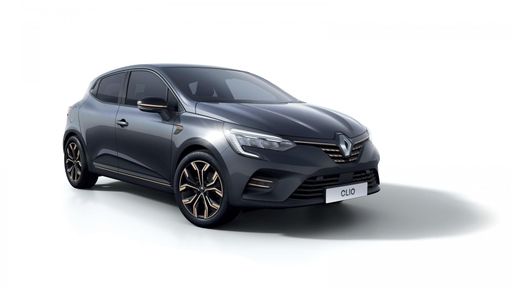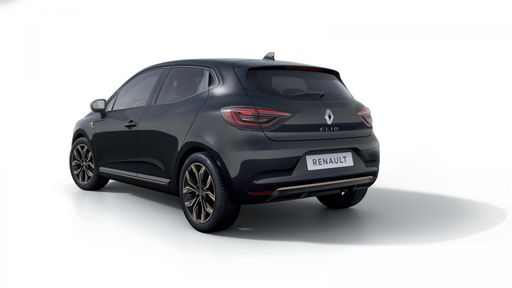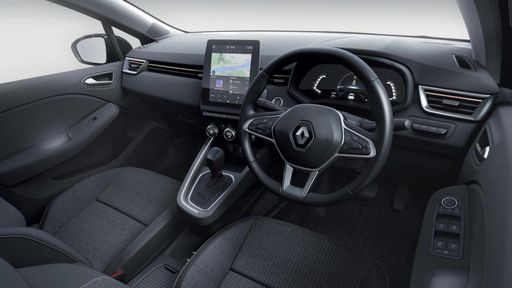Renault Clio vs Peugeot 208 – Differences & prices compared
Compare performance, boot space, consumption and price in one view.
Find out now: which car is the better choice for you – Renault Clio or Peugeot 208?
The Renault Clio (Hatchback) comes with a Full Hybrid or Petrol engine and Automatic or Manuel transmission. In comparison, the Peugeot 208 (Hatchback) features a Petrol, Electric or Petrol MHEV engine with Manuel or Automatic transmission.
When it comes to boot capacity, the Renault Clio offers 391 L, while the Peugeot 208 provides 352 L – depending on how much space you need. If you’re looking for more power, decide whether the 143 HP of the Renault Clio or the 156 HP of the Peugeot 208 suits your needs better.
In terms of consumption, the values are 4.30 L per 100 km for the Renault Clio, and 14.10 kWh4.50 L for the Peugeot 208.
Price-wise, the Renault Clio starts at 16600 £, while the Peugeot 208 is available from 20200 £. Compare all the details and find out which model fits your lifestyle best!
In the dynamic world of compact hatchbacks, the Peugeot 208 and Renault Clio continue to capture the attention of drivers looking for style and efficiency. The Peugeot 208 stands out with its modern design and advanced connectivity features, offering a slightly sportier appeal. In contrast, the Renault Clio impresses with its spacious interior and smooth driving experience, appealing to those who prioritize comfort and practicality in urban settings.
Renault Clio
The Renault Clio continues to impress with its sleek design and agile handling, making it a standout choice in the compact car segment. Inside, it offers a surprisingly spacious and comfortable cabin, crafted with high-quality materials that enhance the driving experience. Its fuel efficiency and reliable performance make it an attractive option for both city commuting and longer journeys.
details @ renault-presse.de
@ renault-presse.de
 @ renault-presse.de
@ renault-presse.de
 @ renault-presse.de
@ renault-presse.de
Peugeot 208
The Peugeot 208 exudes a distinctive French charm, combining sleek lines with an assertive stance on the road. Inside, it offers a modern and sophisticated cabin, complete with intuitive technology and high-quality finishes to enhance the driving experience. Its agile handling and efficient performance make it a delightful choice for both city commuting and longer journeys.
details @ www.media.stellantis.com
@ www.media.stellantis.com
 @ www.media.stellantis.com
@ www.media.stellantis.com
 @ www.media.stellantis.com
@ www.media.stellantis.com
 @ www.media.stellantis.com
@ www.media.stellantis.com
Power and Performance: Under the Hood
The Peugeot 208 offers a diverse range of engine types to cater to different driving preferences, including petrol, electric, and petrol MHEV options. With power outputs ranging from 101 HP to 156 HP, the 208 provides versatility for both urban and highway driving. The torque specs fluctuate between 205 Nm and 270 Nm, ensuring a responsive driving experience.
In contrast, the Renault Clio focuses more on hybrid and petrol engines. Offering power outputs of 67 HP to 143 HP, the Clio caters to drivers looking for efficiency with its full hybrid option. The Clio's torque ranges from 95 Nm to 205 Nm, which provides adequate power for standard driving conditions.
Speed and Acceleration: Going from 0 to 100km/h
The Peugeot 208 showcases an impressive range of acceleration figures, with the fastest model reaching 0-100 km/h in just 8.3 seconds. It also boasts a top speed of up to 200 km/h, providing excitement for thrill-seekers.
The Renault Clio, while more modest in its speed offerings, still delivers solid performance with its hybrid model achieving 0-100 km/h in 9.3 seconds and a maximum speed of 174 km/h. These figures make the Clio suitable for those prioritizing efficiency over raw speed.
Fuel Efficiency and Environmental Impact
When it comes to fuel economy, the Peugeot 208 delivers impressive consumption numbers, with the electric variant consuming as low as 14.1 kWh/100km and petrol options offering around 4.5 to 5.2 L/100km. The CO2 emissions vary significantly, with electric models having a clear zero emissions rating.
The Renault Clio, focusing heavily on hybrid technology, provides a low consumption rate of 4.3 L/100km for its hybrid engine. This makes it a very eco-friendly option and aligns with drivers looking to reduce their carbon footprint.
Interior and Cargo Space
Both the Peugeot 208 and Renault Clio accommodate five passengers comfortably. The Peugeot 208 offers slightly more trunk capacity at 352 litres, compared to the Clio’s range between 301 and 391 litres, depending on the configuration.
The dimensions of the vehicles offer interesting points of comparison, with the 208 measuring 4055 mm in length, while the Clio is slightly more compact at 4053 mm. The width of the Clio is more substantial than the 208, providing a roominess advantage for occupants.
Innovations and Technological Advancements
The Peugeot 208 integrates cutting-edge engineering, with electric models providing a range of up to 432 km on a single charge, thanks to their 51 kWh battery capacity. The inclusion of MHEV variants demonstrates Peugeot's commitment to embracing hybrid technology.
Renault’s Clio showcases its innovation through its full hybrid technology, a major highlight for eco-conscious drivers. The Clio's smaller 0.6 kWh battery aids in efficiency improvements without the weight penalty of a larger battery, keeping the vehicle nimble and economical.
Conclusion: Choosing Your Ideal Hatchback
In the battle of the hatchbacks, both the Peugeot 208 and Renault Clio present strong cases. The 208 stands out with its variety of powertrains, including a compelling electric model for the environmentally conscious. Meanwhile, the Clio’s strength lies in its hybrid technology, providing an optimal mix of economy and performance.
Ultimately, your choice may boil down to what you prioritize more: the diverse offerings and electric innovation of the Peugeot 208, or the hybrid sophistication of the Renault Clio. Either way, both vehicles promise an engaging driving experience in a compact, stylish package.

|

|
|
|
|
Costs and Consumption |
|
|---|---|
|
Price
16600 - 23000 £
|
Price
20200 - 35100 £
|
|
Consumption L/100km
4.3 - 5.3 L
|
Consumption L/100km
4.5 - 5.2 L
|
|
Consumption kWh/100km
-
|
Consumption kWh/100km
14.1 - 15.4 kWh
|
|
Electric Range
-
|
Electric Range
362 - 432 km
|
|
Battery Capacity
0.60 kWh
|
Battery Capacity
46 - 51 kWh
|
|
co2
97 - 121 g/km
|
co2
0 - 117 g/km
|
|
Fuel tank capacity
39 - 42 L
|
Fuel tank capacity
44 L
|
Dimensions and Body |
|
|---|---|
|
Body Type
Hatchback
|
Body Type
Hatchback
|
|
Seats
5
|
Seats
5
|
|
Doors
5
|
Doors
5
|
|
Curb weight
1124 - 1331 kg
|
Curb weight
1165 - 1530 kg
|
|
Trunk capacity
301 - 391 L
|
Trunk capacity
309 - 352 L
|
|
Length
4053 mm
|
Length
4055 mm
|
|
Width
1798 mm
|
Width
1745 mm
|
|
Height
1440 mm
|
Height
1430 mm
|
|
Payload
398 - 406 kg
|
Payload
380 - 430 kg
|
Engine and Performance |
|
|---|---|
|
Engine Type
Full Hybrid, Petrol
|
Engine Type
Petrol, Electric, Petrol MHEV
|
|
Transmission
Automatic, Manuel
|
Transmission
Manuel, Automatic
|
|
Transmission Detail
Automatic Gearbox, Manual Gearbox
|
Transmission Detail
Manual Gearbox, Dual-Clutch Automatic, Reduction Gearbox
|
|
Drive Type
Front-Wheel Drive
|
Drive Type
Front-Wheel Drive
|
|
Power HP
67 - 143 HP
|
Power HP
101 - 156 HP
|
|
Acceleration 0-100km/h
9.3 - 17.1 s
|
Acceleration 0-100km/h
8.3 - 10.9 s
|
|
Max Speed
160 - 174 km/h
|
Max Speed
150 - 200 km/h
|
|
Torque
95 - 205 Nm
|
Torque
205 - 270 Nm
|
|
Number of Cylinders
3 - 4
|
Number of Cylinders
3
|
|
Power kW
49 - 105 kW
|
Power kW
74 - 115 kW
|
|
Engine capacity
999 - 1598 cm3
|
Engine capacity
1199 cm3
|
General |
|
|---|---|
|
Model Year
2023 - 2025
|
Model Year
2023 - 2025
|
|
CO2 Efficiency Class
C, D
|
CO2 Efficiency Class
D, A, C
|
|
Brand
Renault
|
Brand
Peugeot
|
Renault Clio
Introduction to the Renault Clio
The Renault Clio, a popular choice among compact cars, has continually advanced its design and technology to maintain a strong position in the automotive market. With enhancements in engineering, efficiency, and aesthetic appeal, the Clio remains a top contender in the hatchback category.
Advanced Hybrid Technology
The Renault Clio's hybrid technology is one of its standout features. The E-Tech Hybrid system optimises both performance and efficiency, offering a seamless transition between electric and fuel-powered driving. This setup results in an impressive fuel consumption rate of 4.3 L/100km, making it an attractive option for eco-conscious drivers.
Efficient Engine Options
Renault offers a variety of engine choices for the Clio, accommodating different driving styles and preferences. From the economical SCe 65 manual variant to the powerful TCe 100 LPG gas version, each option is engineered to balance performance with fuel efficiency. With outputs ranging from 67 to 143 PS, drivers can enjoy a tailored driving experience.
Design and Comfort
The Renault Clio stands out with its sleek and modern design, characterized by its hatchback body style. The interior boasts an ergonomic layout with seating for five, ensuring passenger comfort and convenience. With a boot capacity of 301 to 391 litres, the Clio also offers practical storage solutions for everyday use.
Safety and Innovation
Safety is a key priority for Renault, and the Clio reflects this commitment with its suite of innovative safety features. Advanced driver-assistance systems are integrated throughout, enhancing both safety and usability. The Clio encompasses features like lane departure warning, automatic emergency braking, and adaptive cruise control.
Cost Efficiency and Environmental Impact
The Renault Clio not only offers affordability with pricing ranging from €18,450 to €26,800, but also promises low running costs. With CO2 emissions between 97 and 130 g/km, the Clio fits well within the C and D efficiency classes. This makes it a cost-effective and environmentally friendly choice for modern drivers.
Conclusion
Renault Clio remains a dynamic, dependable and economical option in the compact car segment. With its innovative technologies, diverse engine options, and commitment to safety and design, the Clio continues to impress and adapt to the evolving demands of the automotive world.
Peugeot 208
A Glimpse into the Future: The New Peugeot 208
The Peugeot 208, with its sleek design and innovative features, continues to set benchmarks in the automotive industry. As a hatchback, it seamlessly blends style with practicality, offering the perfect solution for urban driving and long-distance travels alike. In this article, we delve into the technical details and innovations that distinguish the latest iterations of the Peugeot 208.
Engine Options: Efficiency Meets Performance
The Peugeot 208 provides an array of engine options catering to different driving preferences. Featuring both petrol Mild-Hybrid technology and full electric powertrains, it offers a versatile range designed to accommodate eco-conscious drivers as well as those who prioritise performance.
With power outputs ranging from 101 PS to 156 PS, and a torque span of 205 Nm to 270 Nm, these machines are meticulously engineered to provide thrilling yet efficient drives. The petrol versions utilise a three-cylinder 1199 cm³ engine, optimising fuel consumption between 4.7 and 5.4 L/100km, while the electric e-208 models boast an impressive range of up to 410 km on a single charge.
Advanced Transmission Systems
The Peugeot 208 models come equipped with an advanced automatic transmission system, employing either a dual-clutch automatic gearbox or a manual transmission, depending on the chosen variant. These systems guarantee smooth gear transitions, thus enhancing driving pleasure and overall efficiency.
Performance and Environmental Considerations
From a performance standpoint, the Peugeot 208 impresses with its ability to accelerate from 0 to 100 km/h in between 8.3 to 10.9 seconds, depending on the model chosen. This level of performance is complemented by a top speed ranging from 150 to 200 km/h, ensuring that the 208 is more than capable of holding its own on the motorway.
With environmental consciousness at the forefront, the vehicle's CO2 efficiency class ranges from A to D, further establishing the Peugeot 208 as a responsible option for modern drivers keen on reducing their carbon footprint.
Comfort and Practicality: A Class Act
The interior of the Peugeot 208 reflects its exterior's stylish flair. It comfortably seats five passengers and offers a boot capacity of 265 to 309 litres, accommodating both city commutes and weekend getaways. Advanced comfort features and a state-of-the-art infotainment system ensure that rides are as enjoyable for passengers as they are for the driver.
Cost Considerations
The Peugeot 208 manages to strike a remarkable balance between cost efficiency and luxury. With prices ranging from €22,950 to €40,825, there is a variant to suit most budgets while still providing a premium experience. Additionally, the monthly costs and costs per kilometre are kept in check, making it an economically sound choice in the long term.
Dimensions and Design: Compact yet Spacious
Measuring 4,055 mm in length, 1,745 mm in width, and 1,430 mm in height, the Peugeot 208 maintains a compact profile that is perfectly suited to tight urban environments. Despite its manageable size, it offers ample space inside, thanks in part to clever design and engineering.
Conclusion: A Future-Proof Choice
The Peugeot 208 is a testament to modern automotive innovation. Whether powered by traditional engines or fully electric powertrains, it consistently delivers on performance, efficiency, and style. The combination of cutting-edge technology and sustainable practices places the Peugeot 208 as a forward-thinking choice for drivers seeking a vehicle that epitomises the best of contemporary motoring.
What drivetrain options does the Renault Clio have?
The Renault Clio is offered with Front-Wheel Drive.
The prices and data displayed are estimates based on German list prices and may vary by country. This information is not legally binding.
